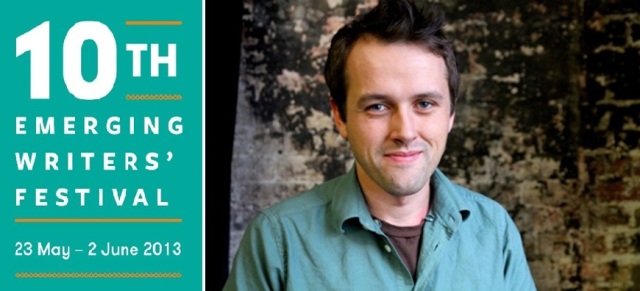the 2013 emerging writers’ festival

The Emerging Writer’s Festival (EWF) is for writers. Midnight scribbler? For you. Aspiring novelist? For you. Screenwriter? Cartoonist? Got short stories published? For you. For you. For you.
In its tenth year, the festival brings together newcomers as well as old hats in the media world (e.g. John Safran and Elmo Keep) to present a varied program in Melbourne. Over eleven days at the end of May, workshops, discussion panels and late night events are on for anyone who puts pen to paper.
Festival director Sam Twyford-Moore is passionate about delivering opportunities for writers’ growth.
‘I’m quite keen to expand the reach of the festival,’ Twyford-Moore says. ‘And we’re travelling to some amazing places.’
He is referring to the exchange of writers with Indonesia. Last week EWF announced Khairaini ‘Okka’ Barokka as 2013’s International Writer in Residence, while Melbournite Laura Jean McKay will be flown to Bali’s Emerging Writer’s Festival. EWF is also holding a Writer’s Retreat on its second weekend, which will see classes on yoga and meditation in Abbotsford Convent exploring the link between writing and wellbeing (no, we’re not all caffeine-addicted and reliant on a bottle of red).
The festival is not just for journalism students and poetry nuts – cartoonist Mandy Ord will be running a free night school session teaching the art of graphic stories. Ord, who is responsible for Sensitive Creatures, is excited about demystifying the journey from conception to comic.
‘I really like talking about comics. I want it to be more hands on – I’ll be talking about the tricks of the trade, and I’ll encourage everyone to do their own short story.’
The workshop will also be an opportunity for attendees to mingle with other artists in the niche field.
‘Networking is a dirty word for some – but you ultimately need to connect with people,’ says Twyford-Moore, ‘and the EWF provides a great space for writers to meet other writers. Other writers are going to be the best advocates for your work – reading it, providing feedback and potentially talking it up to editors. Plus they’re fun to hang out with.’
Bethanie Blanchard, an intern at EWF several years ago, is a walking testimony to these sentiments.
‘Through my position at EWF organising and running events,’ Blanchard explains, ‘I met so many people I’ve admired for years and felt part of a very close team. That led to a role as online intern for Kill Your Darlings journal and from there my position at Crikey. ‘
Blanchard now blogs at Liticism as Crikey’s resident literary critic. As well as finishing a post grad thesis, undertaking freelance work and writing regular reviews for The Australian, Blanchard will be chairing EWF’s Business of Being a Writer Masterclass. The day-long seminar will cover building relationships, self-promotion, and arguably the most debated era of a writer’s life: getting paid.
Earning a full-time wage can seem a pipedream for some, or a long-term, faraway goal.
‘I decided I wanted to be a cartoonist,’ Ord remembers, ‘and soon accepted I’d have to have a day job. It’s kind of a choice to do my own art because it makes me happy, not because it makes me money.’
While many writers have a job on the side to earn money, it is essential to properly manage what little money comes in from creative work. Blanchard explains the importance of conducting yourself as a business.
‘I may still wear pjs when I write, but now I have to think about things like invoicing, superannuation, tax, documenting expenses – things that don’t come as naturally to me, and really aren’t as fun as reading a new novel.’
It’s not just the admin tasks that require a certain amount of drive. Speaking about the importance of seeking opportunities, Twyford-Moore describes how the festival rewards self-motivated writers.
‘EWF, unlike other writers’ festivals, has a number of publication outcomes for writers – including our anthology, The Emerging Writer, which is to be launched this year at the festival and is edited by the incredibly talented Andre Dao. That’s just one of many – everything the EWF does is in, some way, an attempt to help people with their own writing projects.’
It’s these projects that encourage newcomers to conceive of themselves as writers, Ord agrees.
‘In the history of artists it takes a while to establish yourself – not only in the artistic community but in your own head,’ she says.
For Blanchard, being involved with EWF was essential to establishing herself
‘When I was the intern three years ago I helped out at this event and had never earned a cent from my writing. Now I do. That’s the great thing about EWF – it’s relevant at all stages of your career.’
So there you have it. You’ve learnt so much just from a conversation with these artists – imagine how much more you’ll learn at EWF! Have you booked your tickets yet?
Check out the EWF program here.

